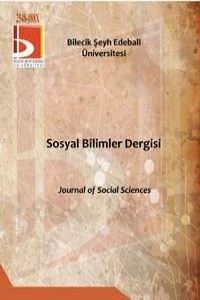Yetenekli Psikolog Dick Diver'ın Trajik Yok Oluşu
F. Scott Fitzgerald’ın Buruktur Gece adlı romanı eğitim ve kariyer gibi güçlü özelliklere sahip bir psikoloğun yeni bir sosyal statüye geçerken ortaya çıkan histeri ve melankoli gibi ruhsal bozuklukların karakteri nasıl trajik bir yok oluşa götürdüğünü göstermektedir. Bu bakımdan romanın başkahramanı ve bir zamanlar ruhsal hastalar için uyguladığı psikolojik tedavilerinden dolayı çok iyi bilinen ve saygı duyulan Dick Diver’in trajik çöküşünü ve kadınlara karşı cinsel arzularından dolayı yok oluşunu anlayabilmek için bu çalışma romandaki parçalar arasındaki yapı ve boşlukları Freud’un histeri ve melankoli teorileri üzerinden açıklamayı amaçlamaktadır.
Anahtar Kelimeler:
Fitzgerald, Çöküş, Histeri, Freud, Melankoli
Tragic Downfall of Promising Psychologist Dick Diver
The work of F. Scott Fitzgerald The Tender is Night shows us how a character like the psychologist Dick Diver having strong qualities such as education and career may collapse upon entering into a new social status which results in hamartia while it causes him to suffer from some mental illnesses such as hysteria and melancholia in his tragic fall down. In this perspective, be able to understand the tragic downfall of the protagonist Dick Diver who was once known well and respected for his psychology treatments for his mental patients then Dick Diver's getting lost in his sexual drives with his interaction with women this study aims to analyze the novel’s structure and the gaps between the parts of the novel with Freud’s theory of hysteria and melancholia.
Keywords:
Fitzgerald, Downfall, Hysteria, Freud, Melancholy,
___
- Arthur Mizener, Twelve Great American Novels. (New York: New York American Library, 1967): 115.
- Berman, R. (2005). American Dreams and ‘Winter Dreams’: Fitzgerald and Freudian Psychology in the 1920s. F. Scott Fitzgerald Review, 4, 49-64.
- Blazek, W., & Rattray, L. (2007). Twenty-First-Century Readings of Tender is the Night. Liverpool: Liverpool University Press.
- Bruccoli, M. J. (2002). Some Sort of Epic Grandeur: The Life of F. Scott Fitzgerald. Columbia: University of South Carolina Press.
- Burton, M. E. (2007). The Counter-Transference of Dr. Diver. Cambridge: Claridge.
- Fitzgerald, S. F. (2000). Tender is the Night. Rpt. London: Penguin Classics.
- Freud, S. (1908a, 2001). Creative Writers and Day-Dreaming. The Standard Edition of the Complete Psychological Works of Sigmund Freud (Vol. IX). London: Vintage.
- Freud, S. (1908b, 2001). Hysterical Phantasies and Their Relation to Bisexuality. The Standard Edition of the Complete Psychological Works of Sigmund Freud (Vol. IX). London: Vintage.
- Freud, S. (1916, 2001). Those Wrecked by Success. The Standard Edition of the Complete Psychological Works of Sigmund Freud (Vol. XIV). London: Vintage.
- Freud, S. (1917, 2001). Mourning and Melancholia. The Standard Edition of the Complete Psychological Works of Sigmund Freud (Vol. XIV). London: Vintage.
- F.Scott Fitzgerald (New York: Chelsea House Publishers, 1985): 187.
- Malcom Cowley, Introduction to the Revised Edition in Three Novels of F. Scott Fitzgerald. (New York: Charles Scribner's sons, 1953): v.
- Ratliff, S. (n.d.). Fatal Vulnerability in the Tragedy of F. Scott Fitzgerald’s Tender is the Night (Unpublished master's thesis): 5.
- Rollyson, C. E., & Magill, F. N. (2000). Critical survey of long fiction. Pasadena, CA: Salem Press.
- West, J. L. (2011). Making the archives talk: new and selected essays in bibliography, editing, and book history. University Park, PA: Pennsylvania State University Press.
- William E. Doherty, Tender Is the Night and Ode to a Nightingale, in Harold Bloom ed.,
- ISSN: 2548-088X
- Yayın Aralığı: Yılda 2 Sayı
- Başlangıç: 2016
- Yayıncı: Bilecik Şeyh Edebali Üniversitesi
Sayıdaki Diğer Makaleler
Suriye Coğrafyasında 1919 - 1921 Döneminde Siyasal Ve Sosyal Olaylar Ve Türkiye - Fransa İlişkileri
Otonom Silah Sistemlerinin Uluslararası Silah Hukuku Ve Politiği Açısından Sorunsal Meseleleri
Uzaktan Öğrenenlerin Öğrenme Biçimlerinin İncelenmesi
Makedonya Cumhuriyeti'nde Barış ve Güvenlik Meseleleri
Yetenekli Psikolog Dick Diver'ın Trajik Yok Oluşu
Türkiye Ekonomisinde Cari Açık Problemi: Seçili Makroekonomik Değişkenlerle Bir Uygulama
Hacı Ahmet KARADAŞ, Esengül SALİHOĞLU, Şerife Merve KOŞAROĞLU
Sakarya’daki Iraklı ve Suriyelilerin Göç Süreçleri, Bütünleşme ve Gelecek Beklentileri
İklim, Coğrafi Konum, Yer Şekilleri Ve Denizlerin Siyasi Coğrafya Üzerindeki Etkileri
